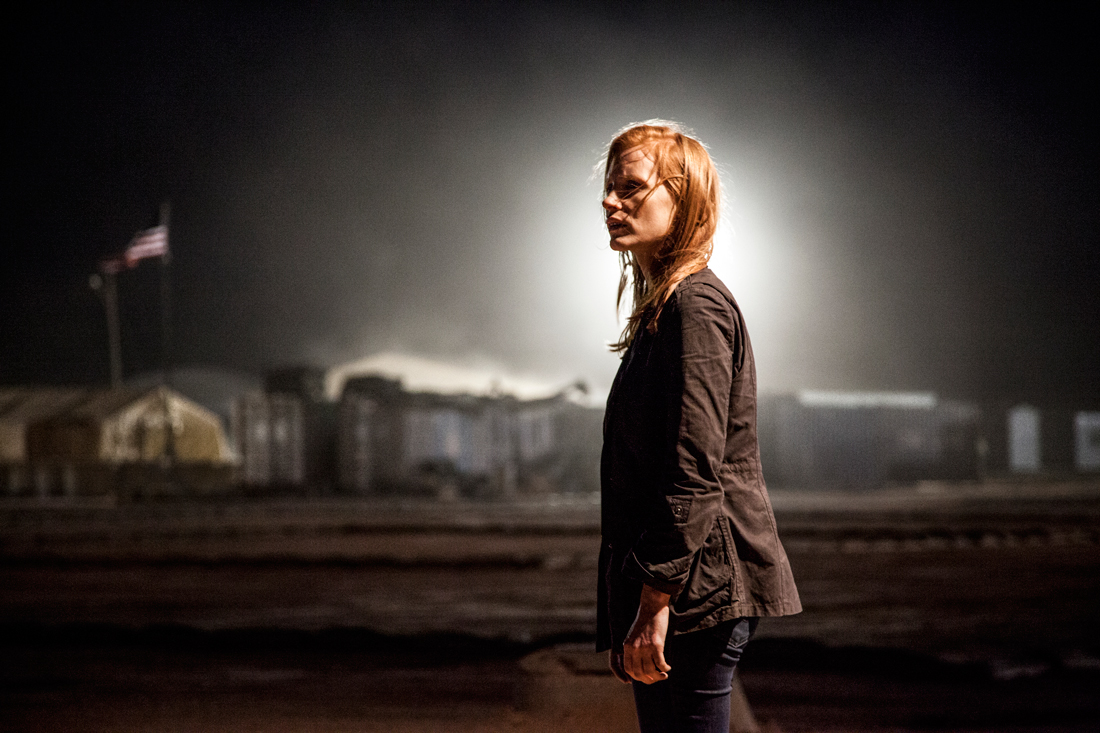OK, everyone. Here it is, the movie where Osama bin Laden bites the big one. And yeah, it’s also topping lots of film critics’ lists of the best movies of 2012, and it’s a mortal lock for multiple Oscar nominations, but who cares about that? Osama gets his ass killed, y’all. Where’s the popcorn?
Yet Zero Dark Thirty comes in towing some baggage. A number of early critics have accused the movie of being pro-torture, and various politicians in the U.S. Senate (including John McCain, who actually was tortured as a prisoner of war) have criticized the movie on its accuracy. I can’t speak to that latter issue, but I have concluded that the film is pro-torture. It doesn’t mean to be, but it is, and I’d argue that’s worse than being purposefully and unreservedly pro-torture. That’s not even the only reservation that I have about this movie, but it’s still worth taking in.
The central character is a CIA analyst whom we know only as Maya (Jessica Chastain). Joining in the agency’s interrogation of prisoners in Afghanistan shortly after the invasion in 2001, she spends the next 10 years following the trail of the terrorist mastermind she calls “UBL,” using an alternate spelling of the name Osama. Her obsessiveness alienates a string of male colleagues and superiors and earns her more than one attempt on her life by Middle Eastern thugs, but eventually it leads to a shadowy character using the handle of Abu Ahmed in Abbottabad, Pakistan. His movements lead her to conclude that UBL is hiding out in a compound there, with Abu Ahmed running his errands.
The character of Maya is based on a real-life intelligence analyst, reportedly the same one who inspired the character of Carrie Mathison on TV’s Homeland. However, we can easily see her as a spiritual kin to Sgt. James, the main character of The Hurt Locker, brought to us three years ago by the same filmmakers, director Kathryn Bigelow and screenwriter Mark Boal. Like James, Maya is a brilliant monomaniac who’s difficult to work with — she refuses to work on other matters of national security and, after pinpointing UBL’s location in early 2011 and delivering her findings, keeps a running total of the number of days bin Laden remains alive afterward by impatiently scrawling the number on her boss’ office window. She even talks trash about the Navy SEALs, while being aware that they’re going to be the ones who kill UBL. Her lopsidedness makes her an incomplete person. It’s also the reason why she succeeds where everyone else fails.
The thing is, when I walked away from The Hurt Locker, I felt like I knew Sgt. James as well as I could ever know such an enigmatic character. I didn’t get that same feeling from this movie, and I’m not sure whether that’s because of the filmmakers or because of Chastain, a talented actress who still hasn’t delivered that one performance that has blown my mind. She does terrific work in individual scenes, like the hallway confrontation where she throws down with a foot-dragging CIA station chief (Kyle Chandler) or at the very end, when Maya weeps not out of happiness or even relief but because the end of the mission has left her with nothing to do. Still, I’m missing the overall sense of an integrated character here.
Bigelow assiduously lays out for us the unsexy work that Maya does to find UBL, which requires following some pretty faint threads. The director punctuates this detective story with her trademark action set pieces. The Navy SEAL operation in Abbottabad — photographed largely in the green glow of night-vision goggles — is crisply executed, and American audiences will undoubtedly find it cathartic. Even more impressive is the sequence midway through as a fellow agent (Jennifer Ehle) meets with an informant claiming knowledge of UBL’s inside circle. Bigelow does slow-burning dread as well as anyone in cinema, and she is masterful here.
She also depicts the torture of CIA prisoners in all its unsavoriness, and here is where she runs into a thicket. The tip that Maya correctly hangs her entire case on comes from a prisoner who has been tortured, and while the movie makes a few nods in the direction of the negative publicity resulting from Abu Ghraib and the toll torture tends to take on the agents administering it, a viewer might very well come away from this with the notion that taking down Osama is worth all the trouble.
The movie pays scant attention to the tons of bad information that torture tends to produce and the alienation it tends to engender among the general population at home and around the world. A more conscientious filmmaker would have found ways to include these ideas without straying too far from the film’s focus. Some critics say this movie simply depicts how things can get messed up when gathering information in a war zone. However, it’s one thing to take in the moral complexities of a difficult situation and allowing the audience to draw its own conclusions and another thing to just be unclear. Zero Dark Thirty is unclear. For a great many reasons, that’s really too bad.
[box_info]
Zero Dark Thirty
Starring Jessica Chastain. Directed by Kathryn Bigelow. Written by Mark Boal. Rated R.
[/box_info]












